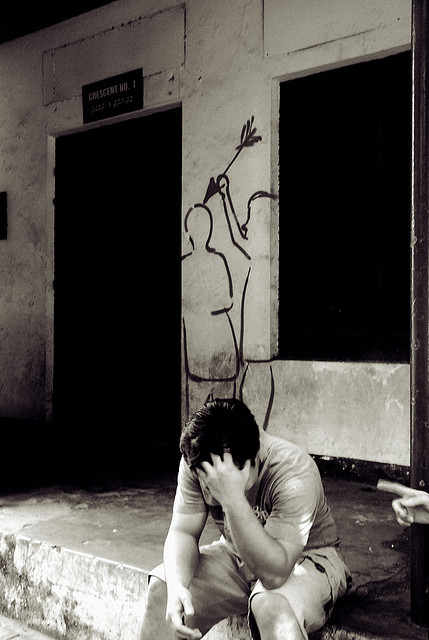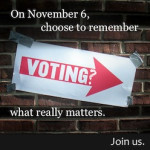We run our website the way we wished the whole internet worked: we provide high quality original content with no ads. We are funded solely by your direct support. Please consider supporting this project.

A Response to Tony Campolo on Fighting the Powers: Some Final Thoughts
In my previous post I argued against Tony’s claim that God expects governments to carry out his will and that Christians are therefore to influence government to carry out this task. I rather argued that, given that governments are premised on human rebellion and are under the oppressive, deceptive and corrupting influence of Satan, we should never expect or rely on government to care for people. We who follow Jesus should rather assume responsibility for the needy and focus all our resources on carrying out this task. For my final response to Tony’s views, I’d like to address an argument Tony uses to support his claim. It is based on the final judgment scene in Matthew 25. Tony says:
In Matthew 25:31–46, we read that God will judge the nations in accord with how each nation cared for the poor, cared for those in prison, and how well they accepted aliens. Please note that God holds nations, not just the church, responsible for caring for the poor. That passage of Scripture should answer those who question whether or not there is a national responsibility to care for those who are needy.
I am not going to dispute that nations have a responsibility to care for those who are needy. All humans have a responsibility to do this, and so of course all humans in government as well as in any other role have a responsibility to do this. But there are two things that I believe are misguided about this argument.
First, the term translated “nations” (ethnos) simply means “people group” or “multitude.” Jesus’ point in saying that “all nations will be gathered” (vs.32) is not to distinguish “nations” from individuals, but to simply express the truth that all individuals from all the world’s different people groups will be brought together on the judgment day. This is why, when the judgment is carried out, it is carried out entirely on individuals. The “son of man” will “separate the people one from another as a shepherd separates the sheep from the goats” (vs. 32). It is individuals, not nations or governments, who are said to have fed Jesus when he was hungry, visited him when he was in prison, etc. (vs. 44-36). And it is individuals, not nations or governments, who are either blessed with “eternal life” or consigned to “eternal punishment” (vs. 46). There is, therefore, absolutely nothing in this passage that addresses how Christians should view governments.
Second, I think it’s particularly misguided to use this passage to encourage Christians to try to get governments to take care of the needy. Yes, governments should do this, and so long as their conscience allows them, Christians can use whatever influence they have to encourage or help governments to do this. Indeed, so long as they’re careful, I see nothing wrong with churches even partnering with governments to serve people. (My church is presently partnering with several dozen organizations to this very end). But as I said in my previous post, given that government is only necessary because of sin, and given that government is under the corrupting influence of Satan, kingdom people should not rely on government to meet people’s needs, and our focus shouldn’t be on trying to get government to better meet people’s needs. I rather contend that all followers of Jesus should assume that it is the job of the church to do this. As the body of Christ, our call is to do exactly what Jesus did in his “first” body. He cared for, and ultimately sacrificed himself for, all who were in need. And so our job is to care for, and sacrifice ourselves for, all who are in need.
Indeed, the distinctive way the body of Christ is willing to sacrifice our time, energy and money to serve others, including those who consider themselves our enemies, is how we are to demonstrate the reality of our king and of his kingdom to the world. We are called to be a community of people who contrast with the world precisely because of our loving, Christ-like service to others.
Sadly, the church in America is not doing this well. Even sadder, however, is that instead of pouring all our energy into getting the church to fulfill her calling, many leaders today are pouring themselves into rallying Christians to get government to fulfill what they believe government’s call is. Not only this, but since Christians are as divided as the general populace about the best way for governments to serve people, this focus on politics invariably invites the divisiveness of the political realm into the church. And this only further incapacitates the body of Christ and keeps her from fulfilling her calling.
Paul writes: “What business is it of mine to judge those outside the church? Are you not to judge those inside? God will judge those outside” (2 Cor. 5:12-13). We can probably agree that government is not doing all it’s supposed to do. In light of what I shared in the previous post, this shouldn’t at all surprise us. But what must concern us deeply is that we are not fulfilling our calling. God will someday judge all who are in government, as he will all others. But it’s not our job as kingdom people to judge them. This we are to leave entirely up to God. Our judgment should rather be focused on ourselves. And so all of our time, energy and resources must be spent on becoming the Church our Lord calls us to be.
As I’ve shared in my previous two posts, I have the utmost respect for my friend and brother Tony Campolo. I know God has used him in powerful ways for decades and that he continues to uses him. And I love the passion with which he calls on Christians to be agents of change in society. I just wish he focused all that passion and talent on rallying Christians to be agents of change by being the church rather than by influencing government.
Image by Ibrahim Iujaz. Sourced via Flickr.
Category: General
Tags: Politics, Tony Campolo
Topics: Ethical, Cultural and Political Issues
Related Reading

The Issue that Unites Us
While there is a great deal of disagreement on political issues and while we can debate (endlessly) on political solutions, there is one thing that should always unite us despite all of this: our ultimate allegiance is not to a politician or a country, but to Jesus alone. One way of demonstrating this unity is…

Why do you argue that discipleship and politics are rooted in opposite attitudes?
Question. At a recent conference I heard you argue against the idea that there could ever be a distinctly “Christian” political position by contending that political disputes are premised on a claim to superiority while discipleship is fundamentally rooted in humility. I don’t think I get what you mean. Can you explain this? Answer: In…

Why is America Becoming More Politically Divided?
I watched a 20/20 special the other night on politics in America. The show explored the “growing political divide” in our country. Here’s some of the information found in this program. * Since the early 70’s Americans have become increasing polarized in their political views. Communities that once were pretty evenly split politically are now…

God’s Warriors
Greg’s ideas on faith and politics were featured in the Peabody Award-winning CNN Presents: God’s Warriors. Watch the full video below. For more information, including behind the scenes footage, visit God’s Warriors – Special Reports from CNN.com.

Don’t Wilberforce’s achievements refute your stance on the separation of faith and politics?
Question: William Wilberforce was a Christian whose passionate involvement in politics almost single-handedly brought an end to the slave trade in 19th century England. Don’t his achievements show the importance of Christians being involved in politics, thus refuting your contention that Christian’s should keep their faith and values separate from politics? Answer: First, while I…

Kingdom Reconciliation is Not About Politics (But it is Political)
In the broader culture, the social and political discussions about racial reconciliation are usually focused on people’s rights and privileges as a means of making the world a fairer place. The criteria such efforts at reconciliation appeal to are common decency, fairness and reason. The enterprise is certainly necessary, and all decent, fair minded, rational…
